-
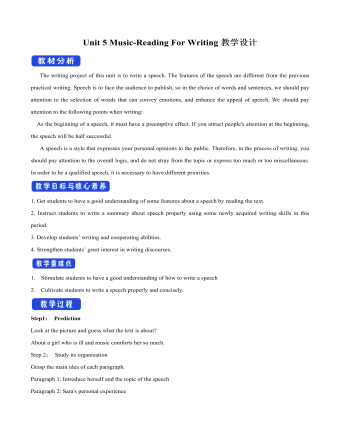
新人教版高中英语必修2Unit 5 Music-Reading For Writing教案一
(4)Now we have heard a number of outstanding speeches ... 我们已经聆听了许多精彩的发言……(5)Because we wanted the nations of the world, working together, to deal with ... 因为我们希望全世界各国团结起来去应对……(6)And if we do not act ... 如果我们不采取行动……(7)Now, I share the concerns that have been expressed ... 我也同意对于……表达的担心(8)Let us show the world that by working together we can ... 让我们告诉全世界,通过一起努力我们可以……(9)It is now time for us to ... 是时候我们……(10)And I have always wished that ... 我一直希望……(11)Thank you for letting me share this day with me.感谢你们和我共度这一天。实践演练:假如你是高中生李华,你校将举办一次以“音乐”为主题的演讲比赛,请你按照主题,写下你的演讲稿。注意:词数100左右。First of all, thank you for listening to my speech. My topic is: love music like love yourself.Music is like the air we need to maintain our normal lives around us. You can't imagine how terrible a world without music would be. Movies and TV shows have no music, only dry conversations and scenes; mobile phones only vibrations; streets only noisy crowds; cafes, western restaurants only depressed meals. What a terrible world it is!As a student, I hope we all can enjoy the fun brought by music in our spare time. Instead of just listening to music, we can even make our own music. Let's enjoy the fun of music!Thanks again for your attention!
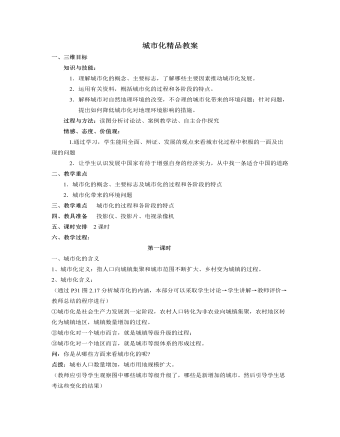
人教版高中地理必修2城市化精品教案
1.改善城市环境:治理河流、控制大气污染物、大力加强绿化建设为改善城市环境,上海市全面展开对大气、河流、噪声等多方面的治理工作。如苏州河的治理、降低城市污染物浓度、加强绿化建设,截止1990年,市区绿化覆盖率达到20.3%。2.改善城市交通、改善居住条件扩宽主干道,修建环城公路,修筑了南浦大桥和扬浦大桥,新修城市高架公路和地铁,改造住宅。3.控制城市规模建立卫星城,开发新区,有效地控制城市中心区的规模。思考:什么时候许多国家采取措施保护和改善城市环境?你认为可以采取哪些措施来保护和改善城市环境?上海市保护和改善城市环境的措施:上海的卫星城有哪些?上海新建了哪个新区?目前浦东新区在上海的地位如何?建立卫星城和开发新区可以起到什么作用?上海市为改善交通条件,做了哪些工作?
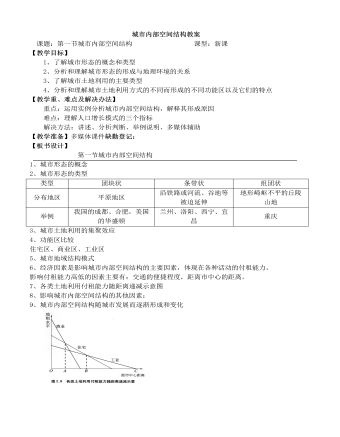
人教版高中地理必修2城市内部空间结构教案
过渡:在实际生活中,城市内部空间结构并非完全按照这一经济规律呈现,而是更具复杂性。这说明除了经济因素外,还有很多其他因素在起作用,请大家结合你的认识、图2.9和案例1:纽约市的少数民族区谈谈你的看法。(2)其他因素I收入——形成不同级别住宅区的常见原因。有能力支付昂贵租金和选择最佳居住环境的人,其居住地往往形成高级住宅区。II知名度——城市内某些地区在历史、文化或经济方面具有很高的声誉,这往往会吸引更多新的住宅或商场建在该处,以提高其知名度。III种族聚居区的形成——在有些城市的某一区域内,如果某个种族或宗教团体占优势,就可能形成种族聚居区。如纽约市的唐人街、哈林区、小意大利区等。IV历史因素——城市的建筑物和街道设计可以维持久远,早期的土地利用方式对日后的功能分区有着深远的影响。
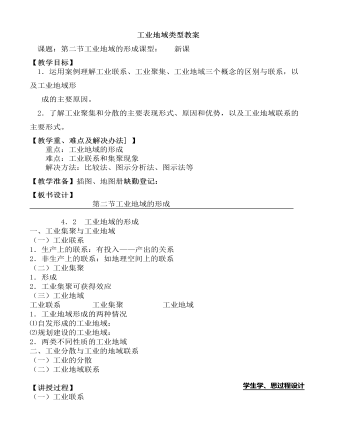
人教版高中地理必修2工业地域类型教案
1.生产上的联系:有投入——产出的关系工业生产的过程复杂,工序繁多,往往需要经过多家工厂的加工才能完成一种产品的生产过程。因此,在这些工厂之间就存在着产品与原料的联系。一家工厂生产的产品是另一家工厂的原料,这两家工厂之间就形成了工序上的工业联系。2.非生产上的联系:如地理空间上的联系布局在同一个工业区内,共同利用工业区的道路、供水、供电、通信等基础设施以及其他生产、生活服务设施,或者共同利用当地廉价的劳动力,形成了空间利用上的工业联系。我国许多地方的经济技术开发区就是建立在这种工业联系基础上的。(二)工业集聚1.形成具有工业联系的一些工厂往往近距离地聚集起来,形成工业集聚现象。2.工业集聚可获得效应(1)工业集聚可以加强企业间的信息交流和技术协作,降低中间产品的运输费用和能源消耗,进而降低生产成本,提高生产效率和利润,取得规模效益。
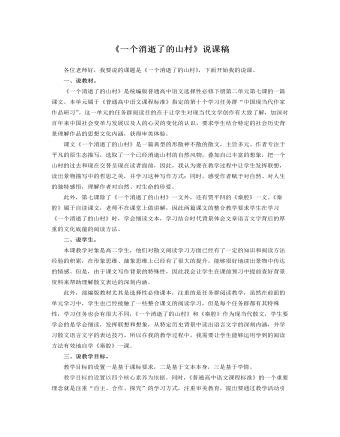
《一个消逝了的山村》说课稿 2021—2022学年统编版高中语文选择性必修下册
这几段内容传达出的是“要敬畏生命,尊重生命;更要敬畏大自然,尊重大自然,爱护大自然”的主旨内涵,因此让学生通过自由朗读的方式,再次体会冯至对这个消逝了的山村的细致的美好的描绘,感悟冯至传达出的对生命,对自然的理解和思考。5.最后一个自然段的解读依然是交给学生,先齐读课文,再让学生自主分享自己的体会或疑惑。但在这一环节我也设计了两个我认为必须解答的两个问题,一是怎么理解“在风雨如晦的时刻”;二是“意味不尽的关联”是指什么。我认为这两个问题一个涉及到写作背景,一个涉及到对全文主旨的一个整体把握,能够进一步帮助学生理解散文的深刻内涵和主旨,让学生有意识的在阅读散文过程中通过背景知识进行理解。既尊重学生的个性化解读,又能够让学生有意义学习,完成预设的教学目标。如果学生没有提到这两处,那我就需要做出补充。
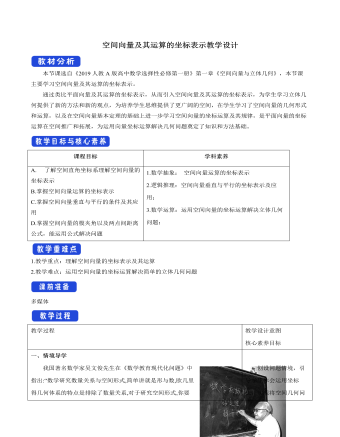
空间向量及其运算的坐标表示教学设计人教A版高中数学选择性必修第一册
一、情境导学我国著名数学家吴文俊先生在《数学教育现代化问题》中指出:“数学研究数量关系与空间形式,简单讲就是形与数,欧几里得几何体系的特点是排除了数量关系,对于研究空间形式,你要真正的‘腾飞’,不通过数量关系,我想不出有什么好的办法…….”吴文俊先生明确地指出中学几何的“腾飞”是“数量化”,也就是坐标系的引入,使得几何问题“代数化”,为了使得空间几何“代数化”,我们引入了坐标及其运算.二、探究新知一、空间直角坐标系与坐标表示1.空间直角坐标系在空间选定一点O和一个单位正交基底{i,j,k},以点O为原点,分别以i,j,k的方向为正方向、以它们的长为单位长度建立三条数轴:x轴、y轴、z轴,它们都叫做坐标轴.这时我们就建立了一个空间直角坐标系Oxyz,O叫做原点,i,j,k都叫做坐标向量,通过每两个坐标轴的平面叫做坐标平面,分别称为Oxy平面,Oyz平面,Ozx平面.
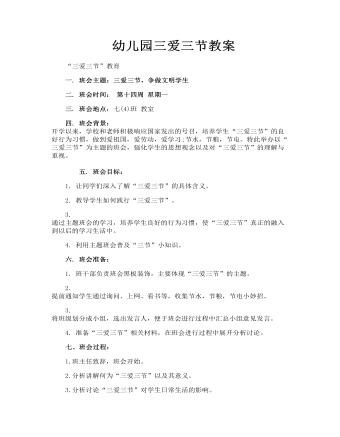
幼儿园教案三篇 幼儿园三爱三节教案
五. 班会目标: 1. 让同学们深入了解“三爱三节”的具体含义。 2. 教导学生如何践行“三爱三节”。 3. 通过主题班会的学习,培养学生良好的行为习惯,使“三爱三节”真正的融入到以后的学习生活中。 4. 利用主题班会普及“三节”小知识。 六. 班会准备: 1. 班干部负责班会黑板装饰,主要体现“三爱三节”的主题。 2. 提前通知学生通过询问、上网、看书等,收集节水,节粮,节电小妙招。 3. 将班级划分成小组,选出发言人,便于班会进行过程中汇总小组意见发言。
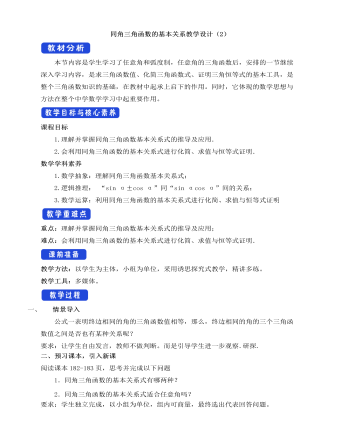
人教A版高中数学必修一同角三角函数的基本关系教学设计(2)
本节内容是学生学习了任意角和弧度制,任意角的三角函数后,安排的一节继续深入学习内容,是求三角函数值、化简三角函数式、证明三角恒等式的基本工具,是整个三角函数知识的基础,在教材中起承上启下的作用。同时,它体现的数学思想与方法在整个中学数学学习中起重要作用。课程目标1.理解并掌握同角三角函数基本关系式的推导及应用.2.会利用同角三角函数的基本关系式进行化简、求值与恒等式证明.数学学科素养1.数学抽象:理解同角三角函数基本关系式;2.逻辑推理: “sin α±cos α”同“sin αcos α”间的关系;3.数学运算:利用同角三角函数的基本关系式进行化简、求值与恒等式证明重点:理解并掌握同角三角函数基本关系式的推导及应用; 难点:会利用同角三角函数的基本关系式进行化简、求值与恒等式证明.
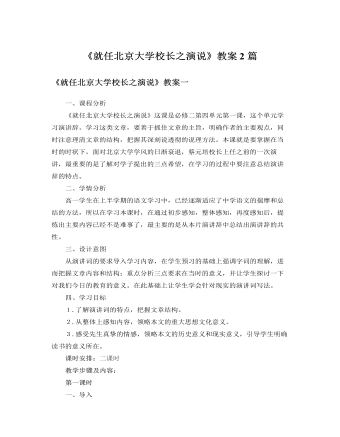
人教版高中语文必修2《就任北京大学校长之演说》教案2篇
(现状:①对于教员,不能以诚相待,礼敬有加,只是利用耳。2段:因做官心切,对于教员,则不问其学问浅深,唯问其官阶之大小。官阶大者,特别欢迎,盖唯将来毕业有人提携。②对于同学校友,不能开诚布公,道义相勖。)他的第三点要求是,要求青年学子。这是从个人涵养方面来说的。尊敬师长,团结友爱,互相勉励,共同提高,是建设良好校风必须具备的条件。端正学风,改善校风,就是为培养学术研究新风气创造条件。全校上下树立了新风尚,学校的学术气也就会很快浓起来。这也是贯彻“思想自由”的办学方针,不可或缺的措施。蔡元培先生在他这次演讲中,始终是围绕着他的办学方针来阐述的。(四)蔡先生提出两点计划,目的为何?思考、讨论、明确:一曰改良讲义,以期学有所得,能裨实用。
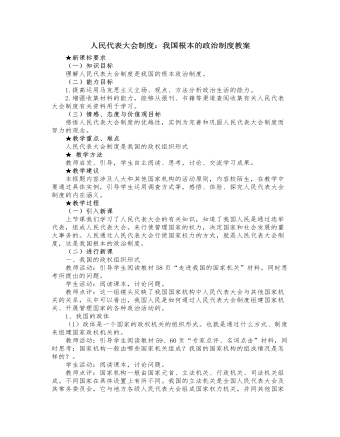
人教版高中政治必修2人民代表大会制度:我国根本的政治制度教案
二、适合我国国情的根本政治制度1、人民代表大会制度的主要内容国家的一切权力属于人民;人民在普选的基础上选举代表,组成各级人民代表大会作为国家权力机关;由国家权力机关产生其他国家机关,依法行使各自的职权;实行民主集中制的组织和活动原则等。2、为什么说人民代表大会制度是适合我国国情的根本政治制度(1)人民代表大会制度是由人民民主专政的社会主义国家性质决定的,是建立其他国家管理制度的基础,是中国社会主义民主政治最鲜明的特点。(2)人民代表大会制度以人民当家作主为宗旨,真正保证了人民群众参加国家管理,充分体现了人民的意志和利益。(3)实践证明,我国人民民主专政的国体和人民代表大会制度的政体,是中国人民奋斗的成果和历史的选择,是适合我国国情的政治制度。(4)建设社会主义民主政治,最重要的是坚持和完善人民代表大会制度,决不照搬西方的政治制度模式。

人教版高中政治必修2人民代表大会制度:我国根本的政治制度教案
(三)合作探究、精讲点拨一、我国的政权组织形式教师活动:引导学生阅读教材58页“走进我国的国家机关”材料,同时思考所提出的问题。学生活动:阅读课本,讨论问题。教师点评:这一组镜头反映了我国国家机构中人民代表大会与其他国家机关的关系,从中可以看出,我国人民是如何通过人民代表大会制度组建国家机关、开展管理国家的各种政治活动的。1、我国的政体(1)政体是一个国家的政权机关的组织形式。也就是通过什么方式、制度来组建国家政权机关的。教师活动:引导学生阅读教材59、60页“专家点评、名词点击”材料,同时思考:国家机构一般由哪些国家机关组成?我国的国家机构的组成情况是怎样的?。学生活动:阅读课本,讨论问题。教师点评:国家机构一般由国家元首、立法机关、行政机关、司法机关组成。不同国家在具体设置上有所不同。我国的立法机关是全国人民代表大会及其常务委员会,它与地方各级人民代表大会组成国家权力机关,并同其他国家机关共同组成我国的国家机构体系。
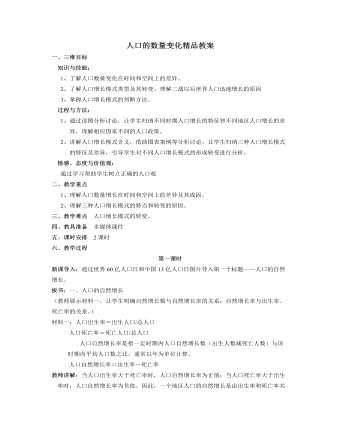
人教版高中地理必修2人口的数量变化精品教案
过渡:下面我们从时间角度分析世界人口数量变化的趋势是怎样的呢?为什么会这样呢?板书:1、人口自然增长的时间变化(引导学生读课本图1.2和图1.3,让学生分析)教师首先让学生说出阅读地理曲线统计图的一般步骤和方法,然后总结归纳:1、 读图名。2、 读各个坐标分别表示什么变量(两图横坐标均表示时间,纵坐标均为相应时期人口数)。3、 判读图形变化特征(两图中曲线曲率的变化反映对应时段内人口自然增长率的大小)。4、 思考变量之间的因果关系(两图均反映不同历史时期世界人口数量增长的不同特点)。问:世界人口数量变化的总趋势是什么?(让学生结合课本P2读图思考题,分析回答同时让学生阅读课本图1.3,在图1.2中找出图1.3所在的时段,指导学生自学P3第一段,让学生分析近100年全球人口快速增长的原因。最后师生共同归纳总结,填写下表。)
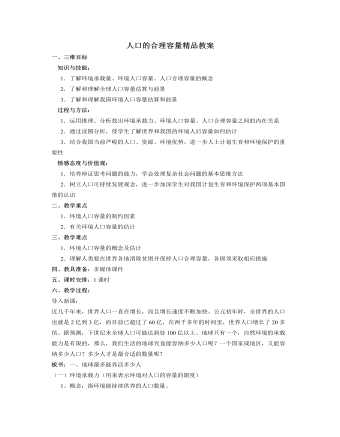
人教版高中地理必修2人口的合理容量精品教案
师:在保证现代人生活幸福,同时又不降低未来人生存质量的前提下,一个地区、一个国家,乃至整个地球到底适合养活多少人呢?为了回答这个问题,科学家在环境人口容量的基础上,又提出了人口合理容量的概念。板书:(一)人口的合理容量1、概念:是指按照合理的生活方式,保障健康的生活水平,同时又不妨碍未来人口生活质量的前提下,一个国家或地区最适宜的人口数量。2、特点:理想的、难以确定精确数值的“虚数”3、概念提出的意义:对于制定一个地区或一个国家的人口战略和人口政策有着重要的意义,进而影响区域的经济社会发展战略。(二)正确处理人类在世界各地消除贫困与保持人口的合理容量的关系本部分采取教师提出问题——学生讨论——阅读教材——学生进一步探讨——学生代表发言——学生补充——教师总结的程序进行:(1)请同学们结合日常生活实例和教材分析说明人类要在世界各地消除贫困并保持人口的合理容量任务的艰巨性?
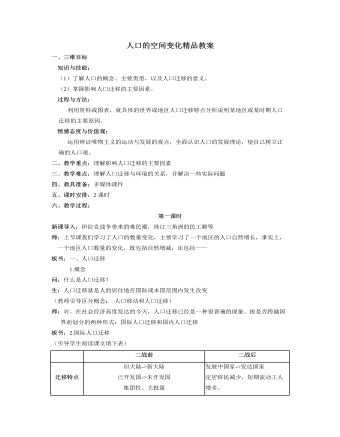
人教版高中地理必修2人口的空间变化精品教案
经济因素对人口迁移是主要的,经常起作用的因素,是人口迁移的基本动因。通常情况下,经济发展水平的差异决定着人们迁移的方向,人们迁移是为了追求更好的就业机会和更高的经济收入。经济发展水平高的地区往往成为人口迁入地,人口的迁移量取决于迁入地对劳动力的需求状况和迁出地人口相对过剩的状况。师:20世纪80年代深圳、珠海等地设立了经济特区’吸I了大量的人口迁入。这又说明了什么问题? (生回答,师总结)从宏观上看,经济布局也会造成大量的人口迁移。说明经济越发达,对人口的吸引力(即拉力)越大。经济发展水平、规模和速度决定着人口迁移的流向、流量和流速。师:交通和通讯又如何影响着人口的迁移呢?生:交通和通讯的发展,缩小了地区之间的距离,促进了人口迁移。
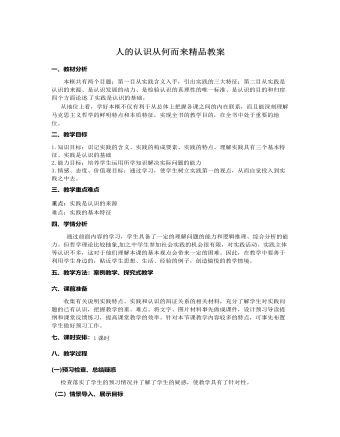
人教版高中政治必修4人的认识从何而来精品教案
一、教材分析本框共有两个目题:第一目从实践含义入手,引出实践的三大特征;第二目从实践是认识的来源、是认识发展的动力、是检验认识的真理性的唯一标准、是认识的目的和归宿四个方面论述 了实践是认识的基础。从地位上看,学好本框不仅有利于从总体上把握各课之间的内在联系,而且能深刻理解马克思主义哲学的鲜明特点和本质特征,实现全书的教学目的,在全书中处于重要的地位。二、教学目标1.知识目标:识记实践的含义、实践的构成要素、实践的特点。理解实践具有三个基本特征、实践是认识的基础2.能力目标:培养学生运用所学知识解决实际问题的能力3.情感、态度、价值观目标:通过学习,使学生树立实践第一的观点,从而自觉投入到实践之中去。三、教学重点难点重点:实践是认识的来源难点:实践的基本特征
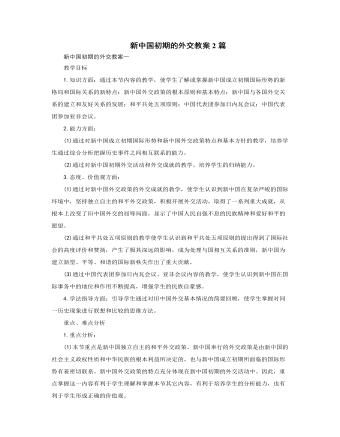
人教版高中历史必修1新中国初期的外交教案2篇
展示幻灯片17、19——21视频18,了解与中国建交的17个国家的概况,说明这是新中国成立后外交上取得的首次突破。 第一个和中国建交的非社会主义国家印度继承了英帝国主义在中国的特权,建国后中印双方多次就西藏问题进行谈判,正是在这一过程中周总理创造性地提出了和平共处五项原则。 成就2和平共处五项原则的提出 展示幻灯片22、23及视频24 探究:和平共处五项原则形成的过程是怎样的?内容是什么?有何意义? 结论(一)三个提出过程,强调重点是首次提出 (二)内容及其修订 (三)意义:标志着新中国外交的成熟;它为开创中国外交新局面奠定了基础;在世界上也产生深远的影响,成为解决国与国之间问题的基本准则。 展示幻灯片25、26 问题情境3:三、步入世界外交舞台
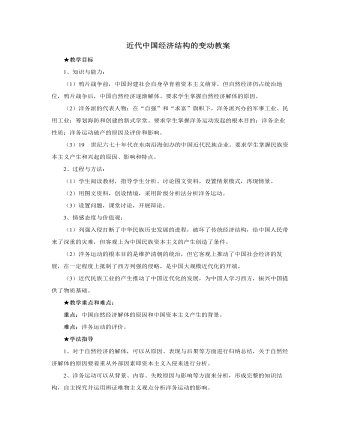
人教版高中历史必修2近代中国经济结构的变动教案
★本课小结:通过学习,我们可以看出鸦片战争后,随着外国资本主义经济的入侵,中国近代经济结构发生了重大变动:自然经济逐渐瓦解,商品经济日益发展,中国民族资本主义产生,中国社会经济结构正经历着一场史无前例的大转型。清政府内部的洋务派为了维护封建统治,掀起了洋务运动。这次运动在促使本国封建经济瓦解的同时,对民族资本主义的产生起了诱导作用。受外商企业和洋务运动的诱导,十九世纪六七十年代民族资本主义在中国产生,由于受外国资本与本国封建势力的压制,举步维艰;下节课,我们将关注中国资本主义的曲折发展。★问题解答⊙【学思之窗】你认为郑观应的批评是否有道理?为什么?参考答案:(1)有道理。(2)原因:①郑观应认识到了社会制度层面的“体”与科学技术层面的“用”之间不是等同的关系。
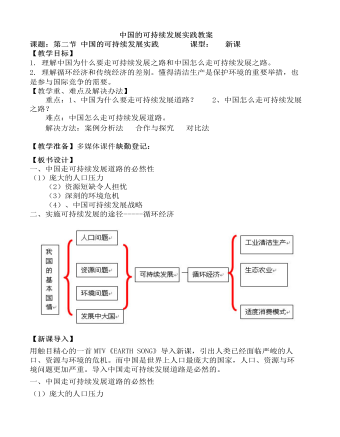
人教版高中地理必修2中国的可持续发展实践教案
1、在工业经济结构调整中,实现循环经济的基本途径是清洁生产让学生分组课前收集乡土地理中清洁生产的案例,将小组收集的案例写成小组作业。让两个小组到课堂上展示,并画出流程图。2、在农业经济结构调整中,我国大力推行生态农业,以实现循环经济留民营村的生态农业按可持续发展的观点,把保护生态环境和发展农村经济有机结合起来 主要措施:(1)调整产业结构:五业并举,全面发展 各业之间相互补充、相互促进、既保持了平衡,又促进了经济的发展 (2)开展综合利用 促进了粮食、牲畜生产的发展,增加了经济效益,降低了污染,净化了环境,有利农民健康,还改变了农田施肥结构,有效地保护了土地资源 (3)广开源流,开发利用新能源 利用太阳能和生物能,节省了以往购煤的开支,还净化了环境 意义和发展方向
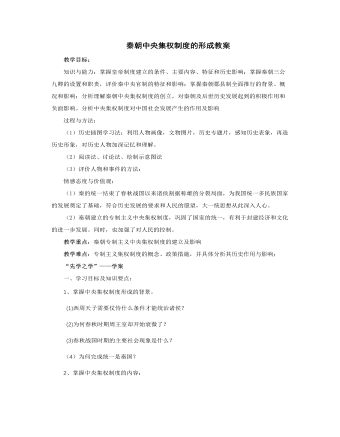
人教版高中历史必修1秦朝中央集权制度的形成教案
教学目标:知识与能力:掌握皇帝制度建立的条件、主要内容、特征和历史影响;掌握秦朝三公九卿的设置和职责,评价秦中央官制的特征和影响;掌握秦朝郡县制全面推行的背景、概况和影响;分析理解秦朝中央集权制度的创立,对秦朝及后世历史发展起到的积极作用和负面影响。分析中央集权制度对中国社会发展产生的作用及影响过程与方法:(1)历史插图学习法:利用人物画像,文物图片,历史专题片,感知历史表象,再造历史形象,对历史人物加深记忆和理解。(2)阅读法、讨论法、绘制示意图法(3)评价人物和事件的方法:情感态度与价值观:(1)秦的统一结束了春秋战国以来诸侯割据称雄的分裂局面,为我国统一多民族国家的发展奠定了基础,符合历史发展的要求和人民的愿望,大一统思想从此深入人心。
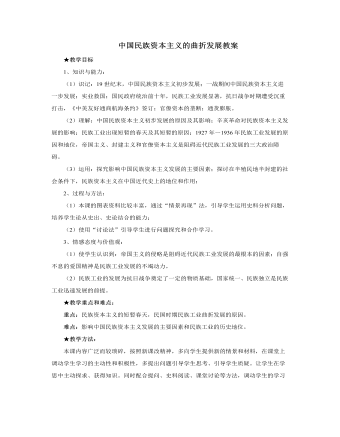
人教版高中历史必修2中国民族资本主义的曲折发展教案
①自然经济的逐步解体;(西方列强的侵略)在给中华民族带来沉重灾难的同时,也不断地冲击着中国社会的生产方式和思想观念,分解着中国自给自足的封建经济。客观为民族工业的兴起和发展提供了某些条件和可能。②清末至民国政府鼓励兴办实业;(历届政府的扶植)由于时代潮流的冲击和巩固统治的需要,清末至民国历届政府都鼓励兴办实业。③反帝爱国运动的推动。(反帝爱国运动的推动)中国人民反帝爱国热情不断高涨,使“实业救国”具有日益广泛的社会基础,特别是抵制洋货、提倡国货运动不断兴起,有力推动民族工业的发展④实业家自强不息的爱国精神。(实业家们自强不息的爱国精神)是支撑民族工业曲折发展的动力和力量的源泉。本课小结:扼要回顾民族工业的曲折发展历程,进而启导学生探究影响其发展的因素,最后分析其历史地位。中国民族资本主义的发展在中国近代史上具有重要的历史地位,对近代中国历史和社会的发展产生了重大影响。





















